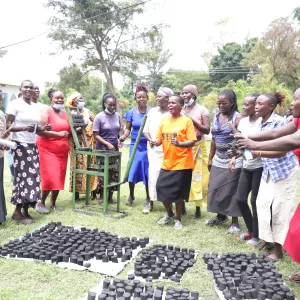From informal to formal: Empowering women in circular bioeconomy business in Kenya
The CGIAR Initiative on Nature-Positive Solutions, the CGIAR GENDER Impact Platform and the International Water Management Institute help women in Kenya professionalize their energy businesses Writing, reporting and photography by Edwin Okoth; editing by Solomie Gebrezgabher and Sean Mattson, CGIAR Initiative on Nature-Positive Solutions Like many women in the low-income neighborhood of Manyatta in Kenya’s Kisumu County, Caroline Oulouch began

From informal to formal: Empowering women in circular bioeconomy business in Kenya
The CGIAR Initiative on Nature-Positive Solutions, the CGIAR GENDER Impact Platform and the International Water Management Institute help women in Kenya professionalize their energy businesses
Writing, reporting and photography by Edwin Okoth; editing by Solomie Gebrezgabher and Sean Mattson, CGIAR Initiative on Nature-Positive Solutions
Like many women in the low-income neighborhood of Manyatta in Kenya’s Kisumu County, Caroline Oulouch began making and selling fuel briquettes to improve the lives of her and her family. She used to make the briquettes manually, and gathered the needed raw material (charcoal dust, clay and water) mostly on her own. She made them with her one good hand and sold them for a low price to customers who use the briquettes for cooking.
Because she made them without the technical knowledge or the machinery needed to compete in Kenya’s burgeoning briquette market, Oulouch’s briquettes did not command a high price. That changed when she teamed up with about 30 other women in her neighborhood to receive training from scientists from the International Water Management Institute (IWMI) to improve the quality of their briquettes, manually mechanize production, and achieve higher prices and lower costs through economies of scale.
“I have been able to support my family of four financially,” Olouch said. “The future is bright with the new methods we have been taught and I hope we get more machines to increase production.
“I found it better than the shame of going to beg along the street like some disabled women do,” she said.

The transformative training, organizing, and support for the briquette-making women in Kisumu is part of CGIAR’s Initiative on Nature-Positive Solutions and CGIAR’s Gender Impact Platform, which include work areas on facilitating, researching, improving waste recycling, and empowering women and youth in rural and peri-urban areas.
The entrepreneurs, known as Tich En Tich Makwangla Women’s Group, now earns far more for their briquettes than before and is growing their enterprise through a “table banking” arrangement by pooling their resources through regular contributions to a central fund which will be used to expand their business. They tripled production from 360 briquettes per day to 1,300 briquettes per day.
IWMI Senior Researcher Solomie Gebrezgabher, who visited the women recently, said the intervention has been key in transforming and quickly expanding their business.
“With the backing of the CGIAR Initiative on Nature-Positive Solutions and CGIAR’s Gender Impact Platform, we supported these women with skills and capacity building to produce quality briquettes. Using the new method where we use carbonization of locally available waste materials like agro-industrial waste and other supporting equipment, we helped them transition from manual to mechanized production. The briquette also has better shape and marketability,” Gebrezgabher said in Kisumu.

The partnership brings together IWMI and local organizations including Participatory Ecological Land Use Management (PELUM) and Support for Tropical Initiative in Poverty Alleviation (STIPA). The collaboration is expected to provide the women with the critical support to meet their objective of economic empowerment.
“The group is very optimistic after receiving support which now enables them to produce charcoal briquettes efficiently and with better quality,” said Eunice Atieno, the group’s chairperson.
“Our group went fully into making briquettes when we saw an opportunity in the disposed charcoal dust. We all had an interest in waste management and recycling. I have confidence in the training we received and now we produce better briquettes since we used to just mix charcoal dust and water and some soil and dry it in the sun. They had irregular shapes and could break easily,” Ms. Atieno said.
The group formally registered meets every week to review their savings and plan their production after it received two briquette-making machines and a mixer, which they now use to make regular briquettes and continue to market locally. They now envision expanding to other markets.

PELUM’s Beth Omae says the group has been trained on critical skills like communications, governance and conflict resolution. She believes the women’s group has great potential that needs to be harnessed.
The group had a steep but fast learning curve, according to Dr. James Gitau, an IWMI consultant in bioenergy.
“We found the women making briquettes using rudimentary methods, they were not crushing charcoal dust, not compacting properly, hence making weak briquettes and they would add more binder/soil compared to the recommended ration. We have trained them on how to get the rations right and how to make quality briquettes using different readily available materials,” Dr. Gitau said.
According to Ms. Pamela Opiyo, who heads STIPA, the women have embraced new ideas in making briquettes including the use of alternative wastes beyond charcoal dust after they were trained.
“The group fitted our profile for recycling agricultural waste and since we supported them to register, they have shown great potential. Now they have machines and they can procure more and better briquettes in even little pain. They are beginning to think business and I see them reaching out to bigger markets, educating their children and building better houses,” Ms. Opiyo said.

